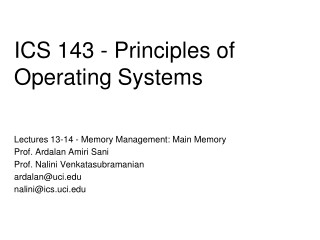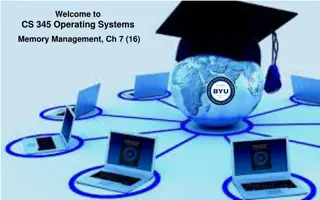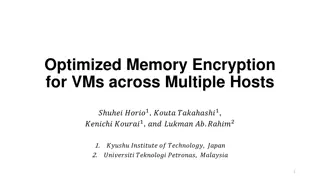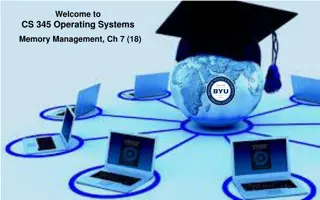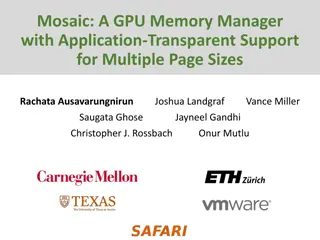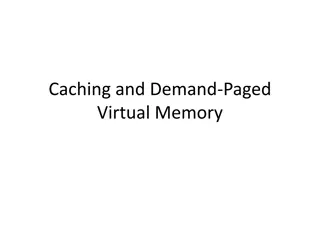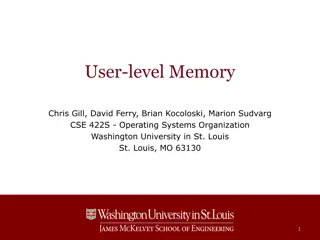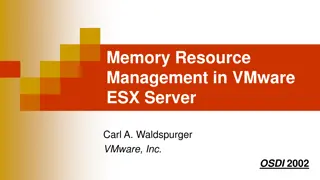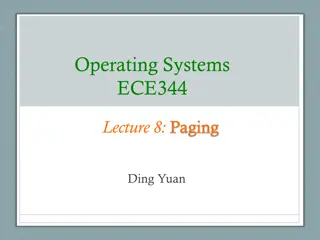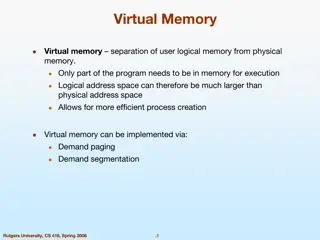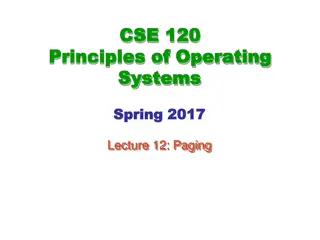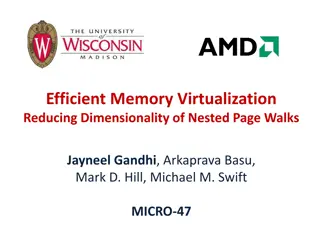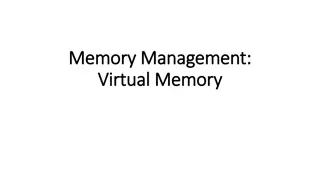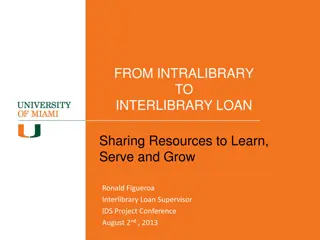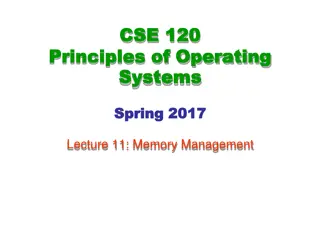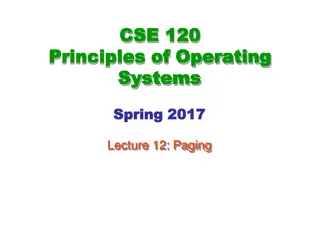ICS 143 - Principles of Operating Systems
The principles and techniques of memory management in operating systems, including swapping, contiguous allocation, paging, and segmentation. Understand the importance of virtualizing resources and controlling overlap, protection, and translation of memory.
0 views • 52 slides
Memory Management Techniques in Operating Systems
Operating systems employ various memory management techniques such as fixed partitioning, dynamic partitioning, paging, segmentation, and virtual memory to efficiently utilize memory resources. These techniques help in organizing memory allocation for programs, managing fragmentation, and optimizing
0 views • 17 slides
Understanding Memory Management Techniques: Segmentation vs. Paging
Memory management is crucial in computer systems to optimize performance and resource utilization. Segmentation and paging are two important techniques used for managing memory efficiently. Segmentation allows for the independent growth and shrinking of different memory tables, while paging provides
2 views • 14 slides
Secure Memory Encryption Techniques for Virtual Machines across Multiple Hosts
Virtual machines with large memory capacities are common in cloud environments. To enhance security during VM migrations and data transmissions, techniques like split migration, encrypted split migration, and encrypted remote paging are employed. However, challenges such as data leakage, high CPU ut
0 views • 16 slides
Understanding Operating System Memory Management in CS 345
This content delves into the intricate processes that occur when a computer boots up, the concept of virtual memory, demand paging, page faults, and simple paging in operating systems memory management. It discusses the initialization steps, paging mechanisms, and hardware considerations involved in
0 views • 12 slides
Mosaic: A GPU Memory Manager Enhancing Performance Through Adaptive Page Sizes
Mosaic introduces a GPU memory manager supporting multiple page sizes for improved performance. By coalescing small pages into large ones without data movement, it achieves a 55% average performance boost over existing mechanisms. This innovative framework transparently enables the benefits of both
0 views • 52 slides
Understanding Caching and Virtual Memory Concepts
Exploring the fundamental concepts of caching and demand-paged virtual memory in computer systems. Topics covered include cache definitions, memory hierarchy, cache concepts for reading and writing, main points on memory management techniques, hardware address translation, demand paging process, and
1 views • 46 slides
Understanding User-Level Memory Management in Operating Systems
Exploring user-level memory concepts such as virtual memory areas, address spaces, paging, forking, and copy-on-write in the context of Linux operating systems. Learn about virtual/physical memory relationships, virtual address translation, process address spaces, and the use of techniques like copy
0 views • 18 slides
Memory Resource Management in VMware ESX Server
This paper discusses innovative mechanisms and policies for memory management in VMware ESX Server, including ballooning, content-based page sharing, idle memory tax, and hot I/O page remapping. VMware ESX is a virtual machine monitor that runs directly on hardware, providing high I/O performance an
0 views • 41 slides
Efficient Paging Mechanisms in Operating Systems
Today's lecture covers various paging mechanisms in operating systems, including optimizations for managing page tables efficiently, utilizing Translation Lookaside Buffers (TLBs) for faster translations, implementing demand-paged virtual memory, and advanced functionality like memory sharing, copy-
0 views • 35 slides
Understanding Virtual Memory and its Implementation
Virtual memory allows for the separation of user logical memory from physical memory, enabling efficient process creation and effective memory management. It helps overcome memory shortage issues by utilizing demand paging and segmentation techniques. Virtual memory mapping ensures only required par
0 views • 20 slides
Paging Mechanisms and Optimal Management in Operating Systems
Covering more paging mechanisms in operating systems, this lecture delves into optimizations for managing page tables efficiently, including techniques like TLBs and demand-paged virtual memory. The focus is on reducing overhead in page table management by mapping only the used address space and imp
0 views • 36 slides
Efficient Memory Virtualization: Reducing Dimensionality of Nested Page Walks
TLB misses in virtual machines can lead to high overheads with hardware-virtualized MMU. This paper proposes segmentation techniques to bypass paging and optimize memory virtualization, achieving near-native performance or better. Overheads of virtualizing memory are analyzed, highlighting the impac
0 views • 48 slides
Understanding Virtual Memory and Memory Management
Virtual memory allows programs to exceed physical memory limits by utilizing disk space, managed by the operating system. By using techniques like paging and page tables, virtual addresses are mapped to physical memory addresses. This article explores the concepts of virtual memory, paging, page tab
0 views • 18 slides
Enhancing Resource Sharing in Libraries
Resource sharing plays a crucial role in the library environment, fostering collaboration and enabling better service provision to patrons. This presentation delves into the significance of sharing resources, in-house cooperation, and best practices. It also highlights the University of Miami Librar
0 views • 38 slides
Making Dynamic Page Coalescing Effective on Virtualized Clouds
Creating huge pages through dynamic page coalescing is effective for reducing TLB misses and memory accesses per miss, although it can lead to memory fragmentation and paging overhead. While highly beneficial on native systems, the cost-effectiveness on virtualized platforms is challenged by the inc
0 views • 22 slides
Memory Management Principles in Operating Systems
Memory management in operating systems involves the allocation of memory resources among competing processes to optimize performance with minimal overhead. Techniques such as partitioning, paging, and segmentation are utilized, along with page table management and virtual memory tricks. The concept
0 views • 29 slides
Understanding Two-Level Page Tables in Operating Systems
The lecture discusses the management of page tables in operating systems, focusing on optimizing space and time. It explores the concept of two-level page tables to reduce overhead in mapping virtual addresses to physical memory. By using a master page table and secondary page table, the system effi
0 views • 36 slides
